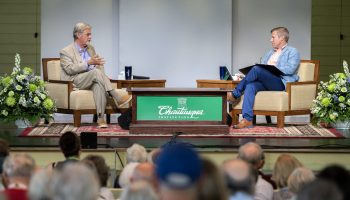From July 17 to 19 in Smith Wilkes Hall, members of the Bestor Society, Eleanor B. Daugherty Society and 1874 Society Fellows were recognized with a special invitation to attend the Scholar in Residence series featuring Amani M. Allen.
Allen, associate professor of community health sciences and epidemiology at the University of California, Berkeley, School of Public Health, delivered three in-depth presentations focusing on social inequalities as fundamental causes of health inequalities following her 10:45 a.m. lecture on July 16 in the Amphitheater.
Each day was part of an overarching theme that explored the role of social inequalities in long-term disparities in health among different races/ethnicities and socioeconomic statuses.
In her presentations, Allen focused on the origins of racial and ethnic classifications, patterns in racial and ethnic health disparities over time and challenges that are associated with underlying evidence and common explanations of racial/ethnic health disparities.
“We have the pleasure of spending the next three days together to dig a little deeper into this idea of how social factors impact health,” Allen said.
Allen presented a video that showed how the stress of racism and discrimination negatively impacts pregnancies in women of color. Social injustices and biases can cause poor health in minorities and people of color.
“I’ve titled this series, ‘Unnatural Causes’ because the kinds of things that we’re going to be talking about — race, racism, socioeconomic position — these are not the kinds of causes we should be dying from,” Allen said. “So we’re going to be talking for the next few days about social inequalities as fundamental causes of health inequities.”
Day two consisted of discussions that focused on self vs. socially-assigned race, and its role in understanding social stress as an explanation for racial health disparities.
Lastly, Allen explored the various ways in which social inequalities make people sick. She also discussed the question of responsibility and accountability related to racial and socioeconomic health disparities.
Members of the Bestor Society and 1874 Society Fellows include Chautauquans who have donated $3,500 or more to the Chautauqua Fund each year, and those who join the Daugherty Society have included Chautauqua in their will or have made a planned gift. Since 1991, the Scholar in Residence program has been offered by the Chautauqua Foundation to express gratitude to these donors for their leadership support.
The Edward L. Anderson Jr. Foundation has underwritten the Scholar in Residence program for the past nine years. Dave Anderson, son of the late Ed Anderson, said the series is a great way to thank members of the leadership giving community for their contributions.
“It’s just really an opportunity for people to dig a little deeper into the topics that they care about and the opportunity to spend some more time with something that’s important to them,” Anderson said.
Anderson attended the program with his wife, Deirdre. He and his brother, Steve, who serves as president of the Edward L. Anderson Jr. Foundation, are dedicated to carrying on their father’s legacy and passion for learning.
For more information about special seminars like the Scholar in Residence program or giving opportunities at Chautauqua, please contact the Chautauqua Foundation at 716-357-6243 or foundation@chq.org.




